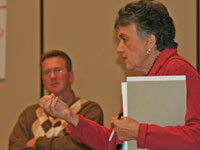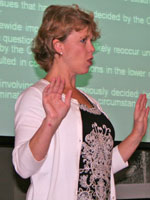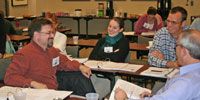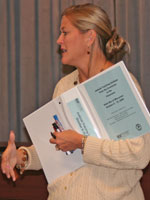
Chief Justice Shirley Abrahamson opens the Judicial Institute.
Oct. 21, 2009 – “The judicial branch is the least understood branch of government in our country,” Chief Justice Shirley S. Abrahamson told 16 middle and high school teachers at the Wisconsin Judicial Teaching Institute, held Oct. 8 - 10 in Madison. “Typically, the U.S. Supreme Court is the only court mentioned in school textbooks. Yet 85 percent of the state judges are elected, and more than 95 percent of judicial business in the country is conducted in the state court system. The federal court system has a very small percent of the total judicial business.”

Supreme Court Commissioner Julie Rich explains how the court decides which cases to hear.
During the two and one-half day event, sponsored by the State Bar, Wisconsin Supreme Court, U.W.-Madison and the Wisconsin Law Foundation, teachers learned about Wisconsin’s court system. They learned how cases are presented and decided before the Wisconsin Supreme Court and how those decisions affect our everyday life. They also learned what it’s like to be a supreme court justice, the difference between municipal and circuit courts, sentencing is the toughest part of the trial judge’s job, and how the supreme court sifts through the 1,000 petitions filed each year to choose the approximately 100 cases it will hear.
The institute culminated in the Supreme Court Hearing Room where the teachers participated in a moot court. Justice Crooks worked with the moot court justices to help them decide State v. Stevens, a 1985 case involving a defendant’s right to be protected from unreasonable searches and seizures under the 4th and 14th amendments to the U.S. Constitution and under Article 1, Section 11, of the Wisconsin Constitution. The case asks whether a defendant’s constitutional rights were violated by the warrantless search and seizure of garbage, which he allowed to be taken from his garage by the regular collector who was acting pursuant to a deputy sheriff’s request. Thomas Balistreri, who argued this case before the Wisconsin Supreme Court, was also on hand to help the teachers through the case.

Teachers, using criteria presented, emulate court to select petitions for review.
In her remarks at a reception on the first night, Abrahamson noted that retired Justice Sandra Day O’Connor, who will be a featured speaker at the State Bar Annual Convention in Madison in May, also is committed to spreading the message of civic responsibility. Justice O’Connor is reaching out to teachers and students through Our Courts, a web-based education project designed to teach students civics and inspire them to be active participants in our democracy.

Beth Ratway, Learning Point Associates, Wauwatosa, presents overview of program.
Thanking the teachers for attending the Judicial Teaching Institute, Abrahamson said, “The state court is the decider of constitutional rights of both federal and state constitutions. Our job is not only to help you, the teacher, to educate the public, but also to be out in the public and listen to concerns and interests in the judicial system.”
Featured presenters included:
Chief Justice Shirley S. Abrahamson, Wisconsin Supreme Court, Madison
Thomas Alisankus, Thomas J Alisankus Law Office, Evansville
Thomas Balistreri, Wisconsin Department of Justice, Madison
Sheri Carter, Office of Lawyer Regulation, Madison
Justice N. Patrick Crooks, Wisconsin Supreme Court, Madison
Patrick J. Fiedler, Dane County Circuit Court Judge, Madison
Philip Freeburg, UW-Extension Local Government Center, Madison
Ellen Henak, State Public Defenders Office Appellate Division, Milwaukee
Rob Henak, Henak Law Office SC, Milwaukee
Dr. Diana Hess, UW Department of Curriculum & Instruction, Madison
Mr. Tom McGlamery, UW Department of Engineering, Madison
Erik Peterson, Wisconsin Department of Justice, Madison
Beth Ratway, Learning Point Associates, Wauwatosa
Julie Rich, Wisconsin Supreme Court Commissioner, Madison
Eric Schulenburg, Schulenburg and Father, Madison
Deb Heneghan is the publications reporter for the State Bar of Wisconsin.
Related:
